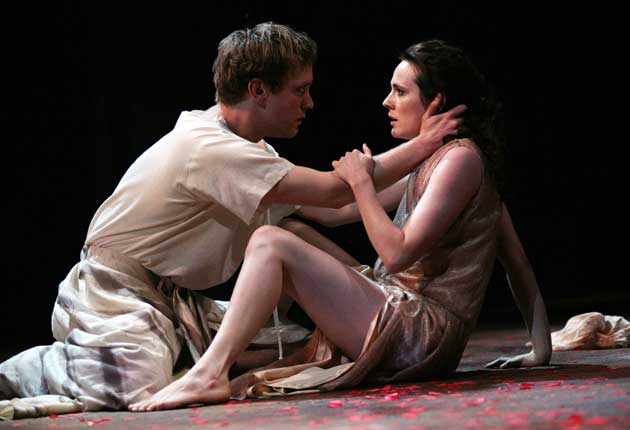Julius Caesar, Courtyard, Stratford-upon-Avon

Like Hermia in The Dream, I am amazed and know not what to say: the seething mob takes a bow at the end of the new RSC Julius Caesar – but they are on film. The video empire strikes back, assuming a reality of relationship with a theatre audience that cannot possibly exist. Or can it?
The Roman populace has been imagined by director Lucy Bailey and designer William Dudley as a frieze of humanity, replicated on gauze screens, based on the muscular attitudes of the Elgin Marbles and the moving photographs of Eadweard Muybridge.
They form a ghostly backdrop to the political action which starts with a vicious wrestling match between two near-naked boys representing Romulus and Remus, founders of Rome. The street festival of Lupercal is indeed a riotous assembly, with Larrington Walker's blind soothsayer stalking the streets like a Rasta refugee from Notting Hill.
It's unusual to sense a mood of political volatility quite this fierce, and Greg Hicks' Caesar enters in a state of taut anxiety. The air whizzes with exhalations and meetings held in dark corners: Bailey's company capture the political ferment very well.
When Noma Dumezweni's Calpurnia recounts her dream of Caesar spouting blood in a bid to keep him at home, he can take comfort in a reinterpretation of the blood's reviving properties. Hicks tripped over his robes on opening night as he declared he was constant as the northern star, but he dies magnificently, falling backwards through his own raised tomb.
A good Calpurnia is matched by the beautiful Portia of Hannah Young, condemned to dwell in the suburb of her husband's pleasure, exposing the wound on her thigh with ambiguous disdain; the troubled Brutus of Sam Troughton is convincingly haunted by this reprimand, and can barely bring himself to report how she swallowed fire. This revelation is dropped like a bombshell in the tent scene, where the argument between Caesar's successors reaches fever pitch on the large thrust stage.
This is a remarkable transformation of this play from one about ways of living in a new democracy to ways of dying with dignity by your own hand. Darrell D'Silva's persuasive Mark Antony is a notable survivor, and there's a distinctive Octavius, too, from Joseph Arkley.
To 2 October (0844 800 1110; www.rsc.org.uk )
Subscribe to Independent Premium to bookmark this article
Want to bookmark your favourite articles and stories to read or reference later? Start your Independent Premium subscription today.

Join our commenting forum
Join thought-provoking conversations, follow other Independent readers and see their replies